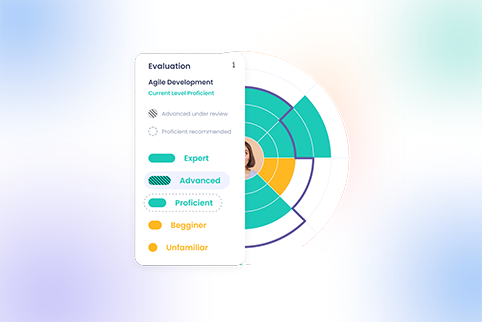
In a world powered by technology, digital skills are quickly becoming the cornerstone of success in nearly every professional field. But as the digital landscape continues to change rapidly, organizations are struggling to find talent that can make the most of the available technologies.
According to Accenture, “If digital skill-building doesn’t catch up with the rate of technological progress, the G20 economies could lose up to $11.5 trillion in cumulative GDP growth by 2028.”
The good news is that employees are on board with upgrading their digital skills. In fact, data from Coursera’s Job Skills Report, with insights from 4 million enterprise learners, reveals that human and digital skills are the fastest-growing areas where people focus their development efforts.
In this article, we’re taking a closer look at the top 10 fastest-growing digital skills and further explore their importance and benefits. Let’s dive right in!
Digital skill #1: Scrum software development
Scrum is a widely adopted methodology that emphasizes collaboration, iterative progress, and adaptability. It is part of the Agile project management framework or philosophy and provides a structured approach for managing complex projects.
Scrum relies on Sprints that can last anywhere between 1-4 weeks and ceremonies — Planning, Daily Scrum, Review, Retrospective — which ensure frequent and proactive adjustments that increase the quality of work and reduce overall project risks.
Although it started as a project management methodology for software development, Scrum has become indispensable across a large number of industries and teams.
Some of the main benefits of adopting and mastering Scrum are:
- Scrum practitioners learn to work effectively in a team, communicate transparently, and leverage the diverse skills of their peers.
- Team members develop an adaptive mindset that enables them to quickly respond to changing requirements, identify and mitigate risks, and continuously deliver incremental value.
- Scrum nurtures a culture of continuous learning by regularly reflecting on the team’s performance, identifying areas for improvement, and experimenting with new ideas.
- The methodology enables organizations to prioritize work based on customer feedback, deliver increments rapidly, and adjust project goals based on evolving business needs.
Learn more about the power of combining Scrum with OKRs.
Digital skill #2: Data visualization
Given the importance of data analytics in the decision-making process of businesses, it’s hardly surprising that data visualization is one of the fastest-growing digital skills.
By representing complex data through simple and easy-to-understand graphics, visualization allows people across various teams to benefit and use data-driven insights.
Management also leverages it to convey organizational structure and hierarchy while data analysts and data scientists use it to discover and explain patterns and trends.
— IBM
In the business world, dashboards are one of the most common types of data visualization, enabling organizations to display real-time insights from multiple data sources.
Integrating data visualizations into your skill set comes with various advantages, including:
- Visual representations of data enable you to convey information, findings, and insights in a concise and engaging manner.
- Visualizing data often uncovers (or clarifies) hidden insights, trends, and relationships that may not be apparent in raw data.
- It fosters a data-driven culture and empowers employees with various levels of expertise to interact and derive insights from data.
Digital skill #3: Customer success tools
In a world where markets and customer expectations keep on shifting, embracing and making the most out of customer success tools can prove to be a decisive factor in the growth of any organization.
These specialized platforms or software support customer success teams in managing and nurturing customer relationships throughout the entire customer journey, including:
- customer onboarding
- engagement tracking
- feedback collection
- identification of potential issues and opportunities
In addition to ensuring customers achieve their goals, other benefits of learning how to leverage customer success tools are:
- Teams can provide more personalized and proactive support, ensuring a positive customer experience.
- Organizations can generate reports, dashboards, and analytics that help employees understand trends, identify growth opportunities, improve decision-making, and optimize their strategies.
- Businesses are more empowered to scale their operations efficiently, ensuring consistency in customer interactions, and delivering a high level of service to a growing customer base.
Digital skill #4: E-commerce
Operating in the digital marketplace has quickly become imperative for businesses that want to stay relevant and reach new markets. It also represents an answer to the expectations of customers to quickly and easily access their favorite services or products with just a few swipes or clicks on their devices.
E-commerce, however, is a complex process that involves various aspects such as online storefronts, payment gateways, inventory management, order fulfillment, data privacy and security, and customer support.
But the benefits of mastering e-commerce as a skill are undeniable:
- Businesses that invest in e-commerce can differentiate themselves from competitors without an online presence, attracting new customers and thriving in the process.
- By providing a seamless online shopping experience, organizations can align with evolving consumer behavior and cater to their preferences.
- Online stores increase scalability and flexibility thanks to the ability to easily accommodate increased website traffic, product catalogs, and order volumes without significant infrastructure investments.
- By analyzing data from e-commerce platforms, businesses can gain a deeper understanding of their customers and further personalize their marketing strategies.
Digital skill #5: CRM software
Customer Relationship Management (CRM) tools are powerful platforms or software that enable companies to effectively manage their interactions and relationships with both existing and potential customers.
By adopting a CRM system, organizations are better positioned to establish and maintain strong connections with customers, streamline their operations, and ultimately improve profitability.
One of the main reasons managing CRM tools has become such an in-demand skill is their evolution and current ability to manage customer relationships through the entire customer lifecycle.
These are some of the main advantages of leveraging CRM software:
- CRM tools enable a holistic view of customers, foster better understanding, and facilitate personalized interactions and targeted marketing efforts.
- By embracing CRM platforms, businesses can track customer interactions, identify opportunities for upselling or cross-selling, and tailor their communications and offerings accordingly.
- Thanks to CRM trends, sales metrics, and customer behaviors, organizations can make data-driven decisions, identify areas for improvement, and optimize their strategies.
With digitization across all industries accelerating, user experience skills are in high demand as consumers expect their needs to be met rapidly, effectively, and in a user-friendly way. Skills related to customer success tools and user experience design have seen increased interest.
— Coursera Job Skills Report
Digital skill #6: User Experience (UX) design
User Experience design is the process of enhancing user satisfaction by improving the overall experience and usability of interacting with an app, service, or platform. The goal of UX designers is to create intuitive and efficient elements (e.g., pages, text, buttons), which users find enjoyable.
Since UX plays a crucial role in driving engagement and achieving business goals, its ongoing increase in popularity as a skill, both among employers and employees, is not surprising.
Other benefits of UX design worth highlighting are:
- Thanks to user research, UX designers can create platforms that enable users to accomplish tasks more efficiently, reduce friction, and minimize the learning curve associated with using a product or service.
- By mastering UX design, professionals can create experiences that not only meet user expectations but exceed them, fostering long-term customer relationships and brand loyalty (just look at Apple as an example).
- If done well, UX design can identify and solve the pain points and challenges of users — leading to more successful and impactful products.
Digital skill #7: Agile software development
With the first skill in this list, we’ve established that Agile is a project management framework and Scrum is only one of the methodologies.
Others include Kanban, Extreme Programming, Crystal Software Development, Feature Driven Development, Dynamic System Development, Lean Software Development, etc.
The main values that unite these methodologies under the Agile umbrella are:
- Individuals and interactions are more important than processes and tools
- Delivering working software is a higher priority than having a comprehensive documentation
- Collaborating with customers takes precedence over contract negotiation
- The default is responding to change rather than following a fixed plan
Agile methodologies aren’t limited to software development and have been adopted by teams across various industries, including marketing, finance, and design.
Some of the main advantages are:
- By promoting adaptability and flexibility, Agile software development enables teams to deliver software that meets evolving user expectations and business goals.
- Thanks to iterative development cycles, software professionals can gather feedback and make adjustments faster, delivering working software in shorter time frames.
- With regular meetings and feedback sessions, Agile improves transparency and knowledge sharing, creating more dynamic and productive teams.
Digital skill #8: Software framework development
Software framework development represents the process of creating and maintaining reusable components and libraries that provide a foundation for software applications. These predefined resources promote code reusability and streamline the development process.
The end goal of development frameworks is to reduce the number of resources needed by developers. This approach comes with multiple worthwhile benefits, such as:
- By following established conventions and coding patterns within a framework, developers ensure a cohesive structure and maintainable codebase.
- Developers can create intuitive and efficient APIs, build powerful abstractions, and implement time-saving functionalities.
- Frameworks often include features such as error handling, logging, and debugging tools that facilitate troubleshooting and maintenance activities.
- By leveraging established frameworks, developers can benefit from built-in security features, such as input validation, authentication mechanisms, and secure data handling.
Digital skill #9: System software development
System software development refers to the creation and maintenance of software that allows physical hardware (e.g., computers, servers, devices) to function and run other applications or programs. In the category of system software, we’ll find:
- operating systems: Windows, macOS, iOS, Android, Linux distributions
- device drivers: audio drivers, touchpad drivers, network drivers, etc.
- firmware: UEFI, BIOS
- programming language translators
Given the ongoing development of technology and the fundamental role of system software, both the benefits and demand of this skill will keep on expanding:
- By developing system software with well-defined interfaces and standards, developers facilitate the smooth operation of software applications across different platforms and hardware configurations.
- Security mechanisms in system software (e.g., access control, encryption) are essential in safeguarding systems against data breaches, malware attacks, and other security threats.
- System software that makes the most out of emerging technologies fosters innovation and empowers organizations to scale, automatize, and achieve tasks faster and with reduced downtime.
Digital skill #10: Search engine optimization (SEO)
Last but not least on our list of digital skills, we have SEO, which is more important than ever in a world where Google’s search engine market share has reached 85 to +90%. Of course, this could change with the advent of generative AI and Microsoft integrating ChatGPT into Bing.
But for now, Google still has all the cards, and businesses with an online presence, regardless of their size, need to optimize their content accordingly.
Search engine optimization aims to improve the visibility and ranking of online content, making it appear as high as possible on the first page of search engine results and reach target audiences.
The main factors influencing SEO are the quality and relevance of content, authority, and trustworthiness. On the technical side, website responsiveness, page loading speed, and user experience are just as important.
The advantages of developing and achieving a high level of SEO skills include but aren’t limited to:
- The increased organic traffic brought by SEO leads to higher exposure, more potential customers, and ultimately, better business outcomes.
- SEO-optimized websites can lead to increased engagement, reduced bounce rates, and improved conversion rates.
- Over time, the long-term benefits of increased organic traffic can outweigh the ongoing costs of paid advertising.
- SEO can improve the competitiveness of organizations as websites that rank higher in search results have a greater chance of attracting clicks and generating leads.
- Insights from SEO data enable informed decision-making and better optimized marketing and business strategies.
Final thoughts
In today’s digitally-driven era, the importance of acquiring and honing digital skills cannot be overstated.
Whether it’s staying ahead of technological advancements, leveraging data to make informed decisions, or engaging with audiences in the digital world, these skills have become the catalysts for professional growth and innovation.
And to remain competitive and profitable in the future, organizations need to make digital upskilling a priority now.







